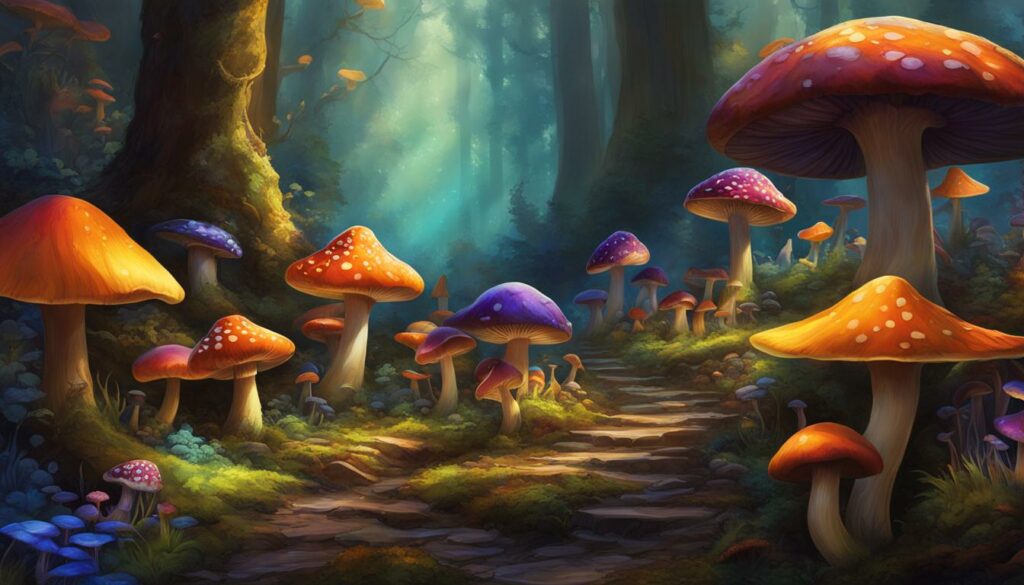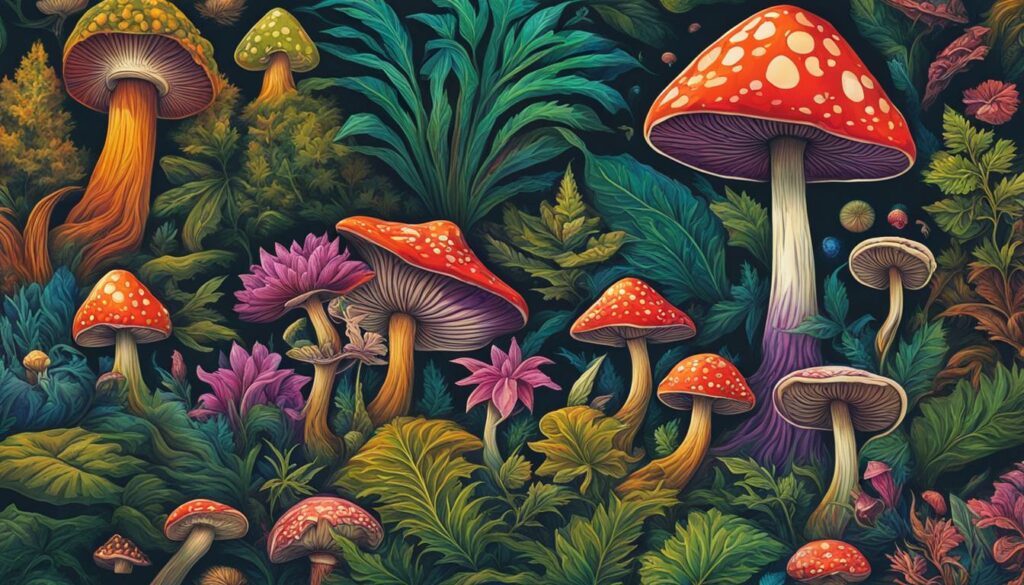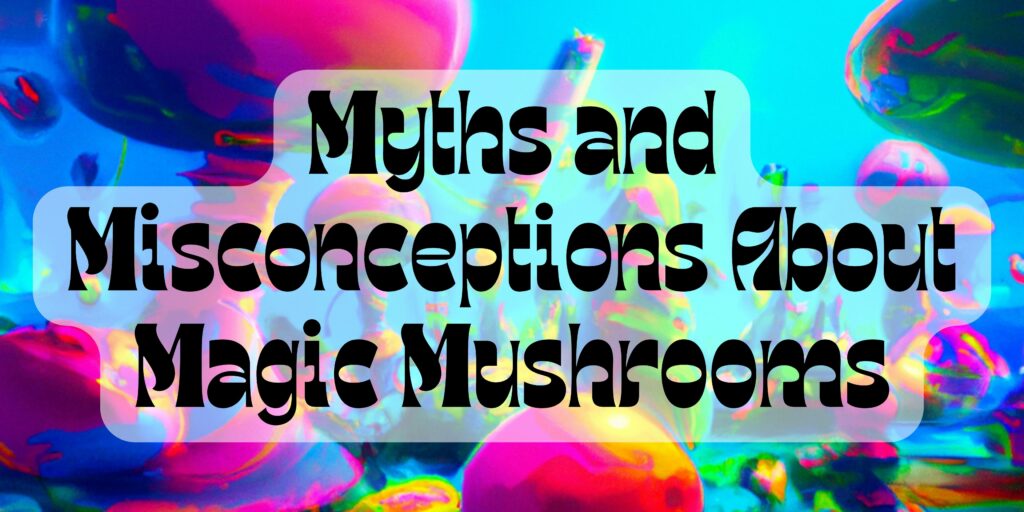Welcome to our friendly guide exploring the intriguing differences between weed (cannabis) and shrooms (psilocybin mushrooms). In this article, we will provide a comprehensive overview of these substances, comparing their effects and shedding light on the distinctive experiences they offer. Whether you’re curious about cannabis or psilocybin mushrooms, this guide will help you navigate the vast world of these intriguing substances.
Key Takeaways:
- Weed (cannabis) and shrooms (psilocybin mushrooms) are both psychoactive substances that produce different effects on the mind and body.
- Weed is commonly used for recreational purposes, offering relaxation, euphoria, and altered perception.
- Shrooms, on the other hand, are known for their hallucinogenic properties, which impact perception, consciousness, and emotions.
- Both weed and shrooms have potential therapeutic applications, but research in this field is ongoing.
- It’s essential to understand the short-term and long-term effects and risks associated with using either weed or shrooms before making an informed decision.
Understanding Weed (Cannabis)
In this section, we will explore the specific details of weed, also known as cannabis. Weed is a widely used recreational substance that has gained popularity for its relaxing and euphoric effects. It is known for inducing a sense of calm and tranquility, making it a popular choice for those looking to unwind or socialize.
Additionally, cannabis has shown promising therapeutic potential in managing various medical conditions. Research suggests that certain compounds in weed, such as THC and CBD, may have analgesic and anti-inflammatory properties, making them effective in relieving pain and reducing inflammation. Cannabis has also been studied for its potential use in managing symptoms associated with conditions such as epilepsy, multiple sclerosis, and cancer.
However, it’s important to note that the legality and regulations surrounding the use of cannabis vary from country to country and even within different states or regions. While some places have legalized the recreational or medical use of cannabis, others still consider it illegal. Therefore, it is crucial to familiarize oneself with the local laws and regulations before engaging with cannabis.
| Recreational Use | Therapeutic Potential | Legality and Regulations |
|---|---|---|
| Weed is commonly used for relaxation and euphoria. | Cannabis has shown potential in managing pain, inflammation, and certain medical conditions. | The legality and regulations surrounding cannabis use vary by jurisdiction. |
| It can induce a sense of calm and tranquility. | Research suggests THC and CBD may have analgesic and anti-inflammatory properties. | Familiarize yourself with local laws and regulations before engaging with cannabis. |
| Popular choice for socializing and unwinding. | Studies are ongoing for its potential use in managing epilepsy, multiple sclerosis, and cancer. | Legal status may differ between recreational and medical use. |
Understanding the recreational use, therapeutic potential, and legality of cannabis is essential for anyone considering its use. By being informed and aware, individuals can make responsible choices that align with their personal circumstances and adhere to local regulations.
Exploring Shrooms (Psilocybin Mushrooms)
Shrooms, also known as psilocybin mushrooms, are a type of psychedelic substance that has been used for centuries for their hallucinogenic properties. When consumed, they can induce profound changes in perception, consciousness, and emotions. The active ingredient in shrooms is psilocybin, which is converted to psilocin in the body and binds to serotonin receptors in the brain.
Research has shown that shrooms have significant therapeutic potential. Studies have suggested that psilocybin-assisted therapy can be effective in treating a range of mental health conditions, including depression, anxiety, and addiction. The psychedelic experience induced by shrooms has been found to promote introspection, emotional breakthroughs, and increased empathy. It can provide individuals with a new perspective on their thoughts, emotions, and behaviors.
| Health Effects | Therapeutic Potential | Psychedelics Research |
|---|---|---|
| Altered perception | Treating depression, anxiety, and addiction | Exploring the benefits of psychedelics |
| Hallucinations | Facilitating emotional breakthroughs | Investigating the effects on brain connectivity |
| Enhanced insight and introspection | Increasing empathy and connectedness | Evaluating long-term outcomes of psychedelic therapy |
Psilocybin has shown promise as a transformative tool in therapy, facilitating deep emotional healing and personal growth. The psychedelic experience can provide individuals with a unique opportunity to explore their inner world and gain insights that may not be accessible in a regular state of consciousness. However, it is important to approach the use of shrooms with caution and in a supervised setting to ensure safety and maximize the potential therapeutic benefits.
Psychedelics research is a rapidly evolving field, with ongoing studies exploring the mechanisms of action, therapeutic applications, and long-term effects of substances like psilocybin. As more research is conducted, we gain a deeper understanding of how shrooms can be harnessed for their therapeutic potential. It is crucial to stay informed about the latest findings, but also to approach the topic with an open and critical mindset, recognizing both the benefits and risks associated with the use of psychedelic substances.

In the next section, we will compare the short-term effects of weed and shrooms, delving into the distinct experiences and sensations they offer. We will explore how these substances affect perception, emotions, and time perception, shedding light on the unique qualities of each.
Short-Term Effects of Weed vs Shrooms
When it comes to the short-term effects of weed and shrooms, both substances can produce distinct experiences and sensations. While weed, also known as cannabis, is known for its euphoric and relaxing effects, shrooms, or psilocybin mushrooms, are renowned for their hallucinogenic properties. Let’s delve into the specific effects of each substance.
Euphoria is a common experience with both weed and shrooms. Weed can induce a sense of relaxation, happiness, and an overall uplifted mood. On the other hand, shrooms can lead to intense feelings of joy, interconnectedness, and profound spiritual experiences. These feelings of euphoria can vary in intensity depending on dosage, individual tolerance, and personal mindset.
Altered perception is another notable effect of weed and shrooms. Weed can enhance sensory perception, making colors appear more vibrant and sound more immersive. It can also distort the perception of time, making minutes feel like hours. Shrooms, on the other hand, can cause profound distortions in perception, resulting in vivid visual hallucinations, changes in the perception of space, and synesthesia, where senses blend together.
Emotional experiences can also differ between weed and shrooms. Weed is often associated with feelings of relaxation, calmness, and tranquility. It can help reduce anxiety and stress. Shrooms, on the other hand, can evoke intense emotional states. Users may experience a wide range of emotions, from profound awe and joy to fear and anxiety. These emotional experiences can be transformative and deeply introspective.
| Short-Term Effects | |
|---|---|
| Weed |
|
| Shrooms |
|
Long-Term Effects and Risks of Weed vs Shrooms
When it comes to the long-term effects of weed (cannabis) and shrooms (psilocybin mushrooms), it’s important to consider the potential impact on psychological well-being and brain chemistry. Prolonged use of both substances can lead to various outcomes, some of which may be beneficial, while others may pose risks to individuals.
One of the potential long-term effects of weed is the development of dependence and addiction. Cannabis use disorder, characterized by a persistent pattern of cannabis use despite negative consequences, can affect a person’s daily life, relationships, and overall mental health. Additionally, heavy and prolonged cannabis use has been associated with cognitive impairments, particularly in memory and attention.
On the other hand, long-term shroom use has been linked to a phenomenon known as Hallucinogen Persisting Perception Disorder (HPPD). This condition causes individuals to experience flashbacks or recurring sensory distortions even after the effects of the drug have worn off. While HPPD is relatively rare, it can have a significant impact on a person’s quality of life and mental well-being.
| Long-Term Effects | Weed (Cannabis) | Shrooms (Psilocybin Mushrooms) |
|---|---|---|
| Dependence and Addiction | Potential for development of cannabis use disorder | No reported addiction potential |
| Cognitive Impairments | Memory and attention deficits | No significant cognitive impairments reported |
| Hallucinogen Persisting Perception Disorder (HPPD) | No reported cases | Possible development of HPPD, leading to flashbacks and sensory distortions |
It’s important to note that the long-term effects and risks of weed and shrooms can vary from individual to individual. Factors such as dosage, frequency of use, and individual susceptibility can influence the outcomes. Additionally, more research is needed to fully understand the potential long-term effects of these substances on brain chemistry, mental health, and overall well-being.
While both weed and shrooms have their unique risks, it’s crucial to approach their use responsibly and be mindful of your own well-being. Understanding the potential long-term effects can help individuals make informed decisions and prioritize their mental and physical health.
Conclusion
In conclusion, this article has provided a friendly guide to understanding the differences between weed and shrooms. By comparing these two substances, individuals can make informed decisions about which one may be more suitable for their needs and preferences.
We have explored the effects of weed and shrooms, both short-term and long-term, to give a comprehensive overview of their potential benefits and risks. It is important to consider personal factors, legality, and regulations when engaging with either weed or shrooms.
Whether you are seeking relaxation and altered perception or exploring the therapeutic potential of these substances, understanding the differences is crucial. Weed, with its recreational and therapeutic uses, offers relaxation and potential pain relief. On the other hand, shrooms, as a psychedelic substance, can provide hallucinogenic experiences and may have therapeutic potential in treating mental health conditions.
Ultimately, the choice between weed and shrooms depends on your individual preferences and goals. Remember to prioritize your well-being and consider the potential risks associated with substance use. By making informed choices, you can navigate the differences between weed and shrooms and choose the path that aligns with your needs and values.
FAQ
What are the differences between weed and shrooms?
Weed, also known as cannabis, is primarily used for relaxation and altered perception, while shrooms, or psilocybin mushrooms, have hallucinogenic properties and affect perception, consciousness, and emotions.
What are the potential therapeutic uses of weed?
Weed has been found to have potential therapeutic benefits in managing pain, inflammation, and certain medical conditions.
Can shrooms be used for therapeutic purposes?
Yes, shrooms have shown potential in treating depression, anxiety, and addiction.
What are the short-term effects of weed and shrooms?
Both substances can cause euphoria, altered perception, and hallucinations, but there are differences in the experiences and sensations they provide.
What are the long-term effects and risks of using weed and shrooms?
Prolonged use of either substance can impact brain chemistry and mental health, and there is a risk of developing conditions like Hallucinogen Persisting Perception Disorder (HPPD) and experiencing flashbacks. Both substances also have addiction potential.
How can I decide which substance is more suitable for my needs and preferences?
It is important to consider personal factors, legality, and regulations when deciding between weed and shrooms.




